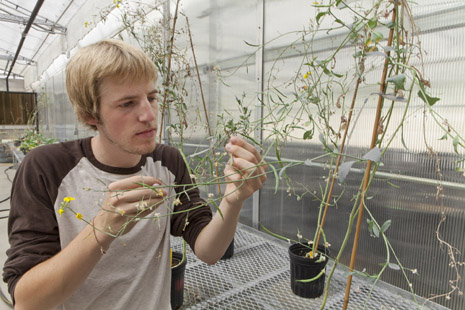Honors College Student Wins EPA Fellowship
FAYETTEVILLE, Ark. – Ty Murdoch, a University of Arkansas Honors College Fellow majoring in biology, has received a Greater Research Opportunities Undergraduate Fellowship from the U.S. Environmental Protection Agency. Murdoch is the second Honors College student to receive an EPA GRO Fellowship this year and one of only 34 national recipients selected from more than 150 applicants.
“The EPA GRO fellowship program creates tremendous learning opportunities for students,” said Bob McMath, dean of the Honors College. “I’m very pleased that two of our students have been selected for this competitive national award, and attribute it to the innovative research being conducted by Honors College students and faculty.”
Murdoch will analyze and map the distribution of herbicide-resistant wild canola. The product of hybridization between wild species and cultivated canola genetically modified for herbicide resistance, this canola is “essentially genetic pollution,” Murdoch noted in his proposal. His research builds upon the work of his adviser, Cynthia Sagers, associate professor of biological sciences, and graduate student Meredith G. Schafer, who discovered herbicide resistant genes from genetically modified canola in 83 percent of the wild canola samples collected along a 3,000-mile swath of North Dakota. Sagers and Schafer carefully noted where and when more than 500 samples were collected, producing a treasure trove of data for Murdoch to mine.
“The idea is for Ty to capitalize on that data, analyzing the information about the environment and health of the plant that is embedded in the tissues of each specimen,” Sagers said.
Murdoch will begin his research by freeze-drying plant fragments and then using a mass spectrometer to analyze the carbon and nitrogen make-up of each plant sample. The ratio of heavy to light carbon reveals how much water is in the environment; a high concentration of nitrogen indicates “that plant can crank – that is, more photosynthesis can take place,” Sagers said. Using GPS coordinates recorded when the samples were taken, Murdoch will map his findings and then cross-reference them with weather records from North Dakota using geographic information system data.
“Essentially you can layer a map of plant characteristics across North Dakota on top of a map of weather at all the same points,” he said. “This will help us draw conclusions about where and under what conditions the plant thrives and what the risk is of gene escape.”
In addition to working with the wild canola samples collected in North Dakota, Murdoch will see if brassica rapa, a common weed that is sexually compatible with canola, may be found in this region and explore the potential for hybridization. He’ll begin next spring by collecting specimens of wild canola and brassica rapa in Arkansas and Oklahoma. He will also grow samples of brassica rapa in a greenhouse to determine whether hybridization rates differ in samples collected in different areas. Murdoch’s research may shed light on the risk of herbicide-resistant wild canola proliferating in the south, particularly important since canola has begun to be grown in this area as a winter rotation crop.
“Ultimately we hope to link his work to climate projection,” Sagers said. “Is there more danger for escape in a warmer state than a cooler state?”
Students awarded GRO fellowships receive support for two years of undergraduate study and for a summer internship at an EPA research laboratory or other facility. The fellowship provides an $800 monthly stipend, up to $20,000 for tuition and fees, $5,000 for research expenses, and a $9,500 stipend in support of the summer internship. Murdoch hopes to study abroad next year at the Organization of Tropical Studies in Costa Rica.
Ali McAtee, an Honors College junior studying chemical engineering, received a GRO Fellowship earlier this year for research on algae that she is conducting under the direction of Jamie Hestekin, assistant professor of chemical engineering.
Topics
Contacts
Cynthia L. Sagers, professor, biological sciences
J. William Fulbright College of Arts and Sciences
703-292-8712,
csagers@nsf.gov
Kendall Curlee, director of communications
Honors College
479-575-2024,
kcurlee@uark.edu
Headlines
Four Students Named Goldwater Scholars; Two Earn Udall Honorable Mentions
Four U of A students have received the prestigious Goldwater Scholarship, an award for top students in mathematics, science, and engineering.
Cross-Campus Collaboration Culminates in New Outdoor Geological Installation
Grand opening event to celebrate the new GeoLab installation at the U of A’s Gearhart Hall courtyard is set for May 3. The installation will be open to the public year-round.
First Students to Use Online Degree to Hone Nursing Leadership, Elevate Patient Care
Hanna Baxendale and Wendi Kimbrell will begin coursework in the Doctor of Nursing Practice-Executive Master of Business Administration program offered by the Eleanor Mann School of Nursing and Walton College.
Join the Office for Sustainability on a Final Cruise to Campus
Cruise to Campus Wednesdays have fostered a gathering space for individuals interested in biking to campus. Drop by the Old Main Lawn from 7:30-10 a.m. Wednesday for coffee, something to eat and conversation.
Fay Jones School Student Ambassador Program Gives Voice to Design Students
The student ambassador program at the Fay Jones School of Architecture and Design is built to connect top design students with their school, its alumni, its future students and others inside and outside the school.





